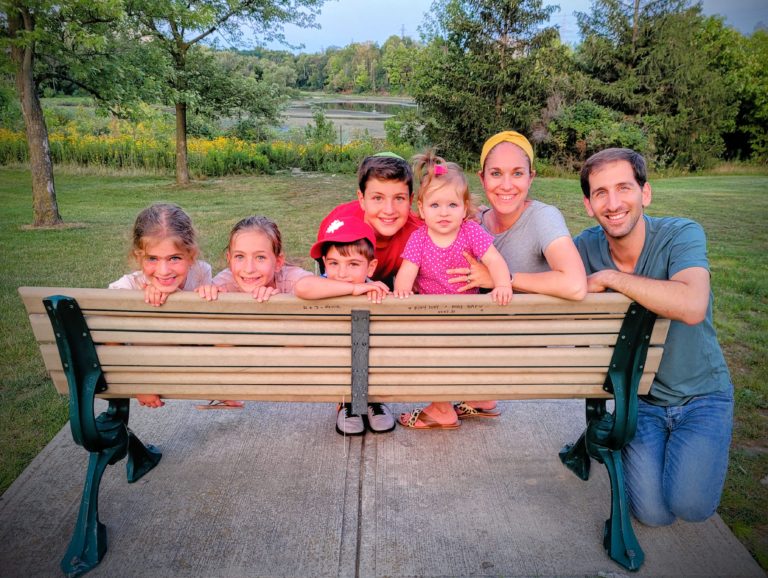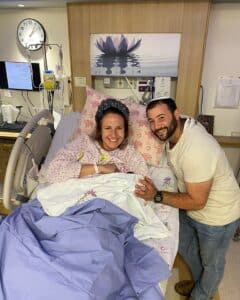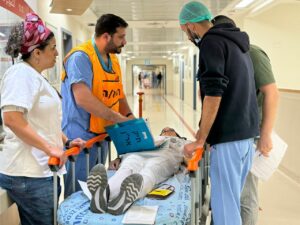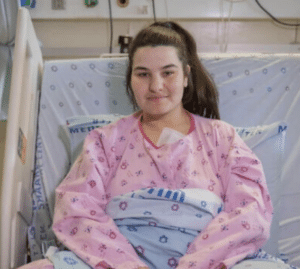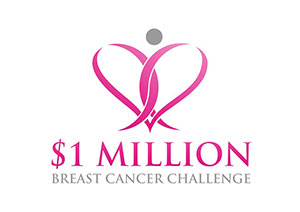The Canadian Shaare Zedek Hospital Foundation:
What Hospital are you working at?
Yishay:
Most of my training during the Fellowship has been at Toronto Western Hospital, but I’m also privileged to be able to rotate and practice in several other institutions and hospitals including: Credit Valley Hospital, Mississauga Hospital, Queensway Health Center, Kensington Eye institute, and TLC Laser Eye Centre.
The Canadian Shaare Zedek Hospital Foundation:
What are you specializing in?
Yishay:
I’m mainly specializing in Corneal Transplantation Surgeries. The cornea is the most common and successful tissue transplantation. While recent advancements in corneal transplantation have made the surgery safer, it is also more challenging to master, hence the need to sub-specialize in high-volume medical environments outside of Israel.
The Canadian Shaare Zedek Hospital Foundation:
What do you enjoy most about Toronto?
Yishay:
My family and I are really enjoying our time here. We were welcomed by a warm community in Thornhill, our kids are loving their school (Netivot Hatorah), and professionally, I feel a great sense of satisfaction from my progress at the hospital. Above all, what my family and I enjoy the most is our time together each Sunday, when we usually go to explore Canada’s beautiful nature, I wish we could bring this back home with us to Israel!
The Canadian Shaare Zedek Hospital Foundation:
Where in Israel do you live?
Yishay:
I was lucky to be born and raised, study, train, and practice Ophthalmology, and build a family in the most beautiful city in the world—Jerusalem. There are no words to fully express my love for this unique and magical place, which will always be my home.
The Canadian Shaare Zedek Hospital Foundation:
What do you miss most about Israel?
Yishay:
So many things! Firstly, I miss my family and friends. I also miss how the streets become empty before Shabbat, the delicious Kosher restaurants, speaking mostly Hebrew, my patients, the gorgeous weather. I miss calling everyone I meet “Akhi” (“my brother”) even without knowing them. And I miss eating cottage cheese and cucumbers, of course!
The Canadian Shaare Zedek Hospital Foundation:
Why did you want to be a doctor?
Yishay:
Truly, whenever I am asked this question, I always think the opposite should be asked instead: Why not become a doctor? My decision to become a doctor was driven primarily by values instilled in me by my family, my education, and my Jewish faith. I can’t imagine a more fulfilling profession than one that focuses on helping others, and improving people’s health and quality of life.
The Canadian Shaare Zedek Hospital Foundation:
What is your favourite aspect of your job?
Yishay:
I absolutely love my operating room sessions. Operating on a human eye is an indescribable feeling. This is a time when you need disconnect from everything, and always be at your best. Eye surgery is usually done under a microscope and requires great precision, coordination, patience, and concentration. I get to literally bring light to my patients’ lives—this is the most humbling feeling.
The Canadian Shaare Zedek Hospital Foundation:
What do you think are the main differences between healthcare in Israel and Canada?
Yishay:
I was surprised to see that there are many similarities between the Israeli and Canadian health systems. They both provide high levels of public healthcare.
The Canadian Shaare Zedek Hospital Foundation:
What do you like to do in your personal time?
Yishay:
Since starting medical school, personal time is hard to find, especially with my five children at home. When I am lucky enough to have some personal time I enjoy spending it with my family and close friends. One day I’ll go back to my guitar, sports, and take those history courses I always wanted to attend.
The Canadian Shaare Zedek Hospital Foundation:
What are your top three tips for maintaining a healthy lifestyle?
Yishay:
As an Ophthalmologist, I’ll share some tips for healthy eyes:
1) Wear sunglasses: Wearing sunglasses protects the eye from Ultraviolet (UV) Radiation, and can prevent cataract, Age Related Macular Degeneration (AMD), and certain types of eye cancer. And, as a bonus, they’re also stylish!
2) Wear protective eyewear: It’s really important to protect your eyes when handling machinery, and while playing sports. You’d be surprised how many eye traumas we treat every day in clinic and in the ER. It is really frustrating to know that a simple measure such as wearing protective eyewear could have saved vision in many of these cases.
3) Stop rubbing your eyes: Most of us do this regularly, but for some of us this habit can cause Keratoconus (Cornea Distortion), and serious vision loss. Other less severe complications include superficial bleedings, infections, inflammation, changes in the skin around the eyes, and many more.


